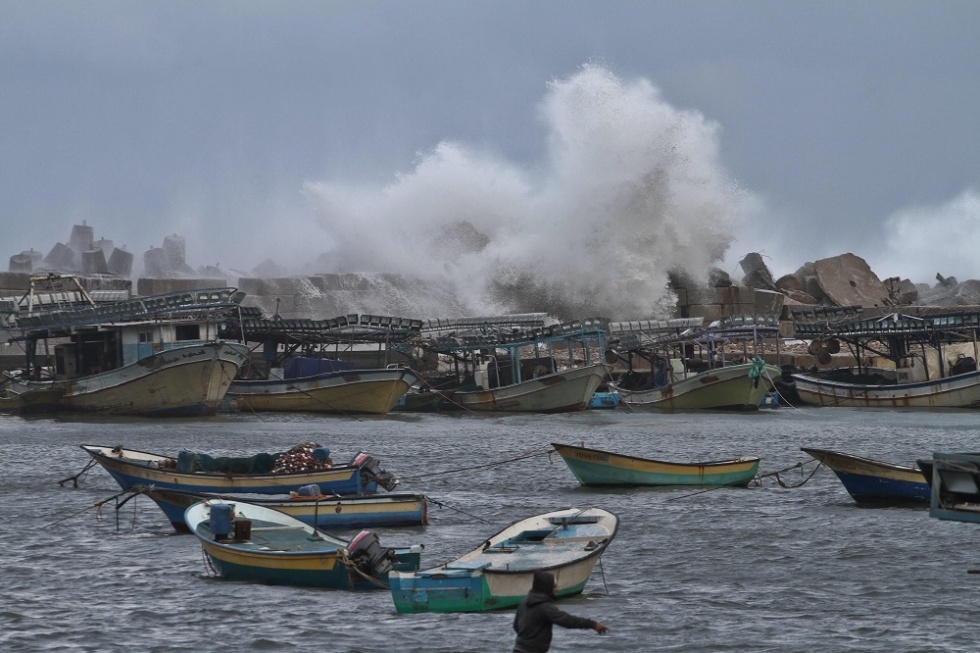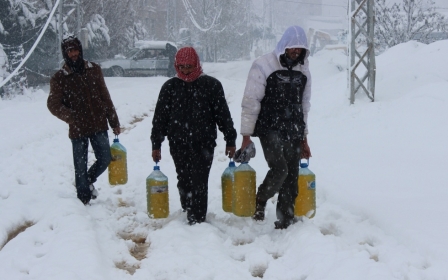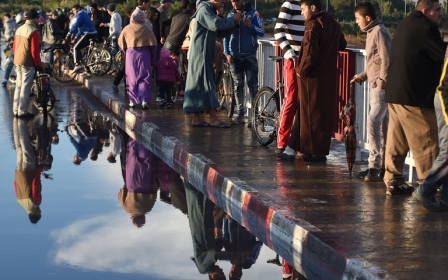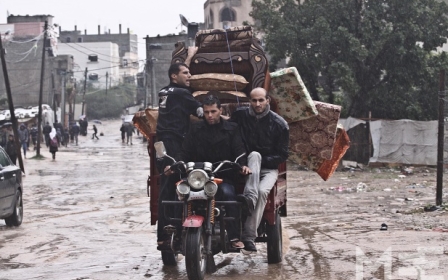Gaza hard-hit by heavy regional storm

RAFAH, Gaza: War-torn Gaza has been ravaged by bad weather as an unusually fierce storm continued to whip the region on Thursday.
With much of the coastal enclave’s infrastructure badly damaged during this summer’s 51-day war with Israel, many roads and homes became flooded in low-lying areas, after heavy rains made sewage levels rise. Hundreds were forced to flee their homes with some schools and public buildings closing their doors as authorities declared a state of emergency on Wednesday.
A handful of weather-related injuries have been reported so far, but the full extent of the damage is not yet known, as bad weather is continuing and some areas have proved hard to reach.
People were left stranded as rescue crews struggled to get to the worst affected areas, with emergency efforts hampered by a lack of supplies and equipment. Many volunteers rushed to try and help first responders, but while manpower was not in short supply, the lack of water pumps seriously inhibited efforts.
The snowstorm that has ravaged the region over the last two days has been dubbed “Huda” in Gaza and is the coldest in decades.
Mohammed al-Jamal, a Rafah resident, said that his family had been left struggling to cope as they were unable to close up structural damage to their homes, which had been shelled during this summer’s war.
“Nature is angry, I wish we only have the means to repair holes in our walls and warm up our homes,” said Mohammed al-Jamal, as his six-year-old daughter Lamia clutched at him for warmth.
“In the summer we could not protect [our children] from tank shells and in the winter we can’t protect them from the freezing weather,” al-Jamal said.
Neighbouring Lebanon, Syria, Jordan, Turkey and Israel have all be badly hit by the unusually heavy downpour, but while some areas were able to prepare for the bad weather, others were also extremely hard-hit as heavy snows fell and high waves battered coastal areas.
Syrian refugees, many of whom are living in makeshift tents and other kinds of accommodation in Lebanon and Jordan bore the brunt of the bad weather. In Lebanon, at least three refugees, including an 8-year-old Syrian boy froze to death on Wednesday and the UN “extremely concerned” for the wellbeing of more than one million Syria refugees in Lebanon and more than 600,000 in Jordan.
The weather is scheduled to ease by Friday afternoon but fierce winds and frosty temperatures are still expected to grip much of the region overnight, with speeds reaching up to 100 kilometres an hour.
“Those holes bring extremely fierce wind, which hits deep in our bones,” Jamal said.
In Gaza up to 19,600 families are still displaced from the war and either living in UN schools and shelters, to taking refuge in war-damaged buildings that are ill equipped to handle the cold and wet.
"Hundreds of Palestinians' houses in Gaza City are at risk of flooding in areas where infrastructure has been most damaged," Gaza’s municipality said in a statement.
Very few homes in Gaza have central heating, and the rare few that do are largely unable to use it as power and energy provision remains off for most of the day with electricity cuts occurring for about 16 hours of the day. Widespread shortages of fuel and cooking gas have also been reported, with Israel’s ongoing blockade severely restricting supply.
Some have resorted to burning logs or using candles to try and stay warm, but fires are frequent and many Gaza residents do not want to take the risk, no matter how cold they get.
Since 28 December, Gaza’s power plant has been shut due to fuel shortages and conflict over fuel tax which Gaza’s Electricity Distribution Company says it can't afford to pay.
According to the United Nations Office for Coordination of Humanitarian Affairs, the power plant closure has rendered Gaza entirely dependent on the supply of electricity purchased from Israel (120 MW) and Egypt (30 MW), although this can only meet less than a third of the estimated demand.
The curtailing of rations sparked a panic in Gaza City as hundreds of people rushed to the city’s bakeries and grocery stores in the wake of the storm in an attempt to stock up on supplies ahead of the big chill.
Last year, another storm, known as Alexa, also wreaked havoc on Gaza, displacing hundreds of families who had to flee as a result of the torrential rainfall and floods.
Middle East Eye propose une couverture et une analyse indépendantes et incomparables du Moyen-Orient, de l’Afrique du Nord et d’autres régions du monde. Pour en savoir plus sur la reprise de ce contenu et les frais qui s’appliquent, veuillez remplir ce formulaire [en anglais]. Pour en savoir plus sur MEE, cliquez ici [en anglais].




